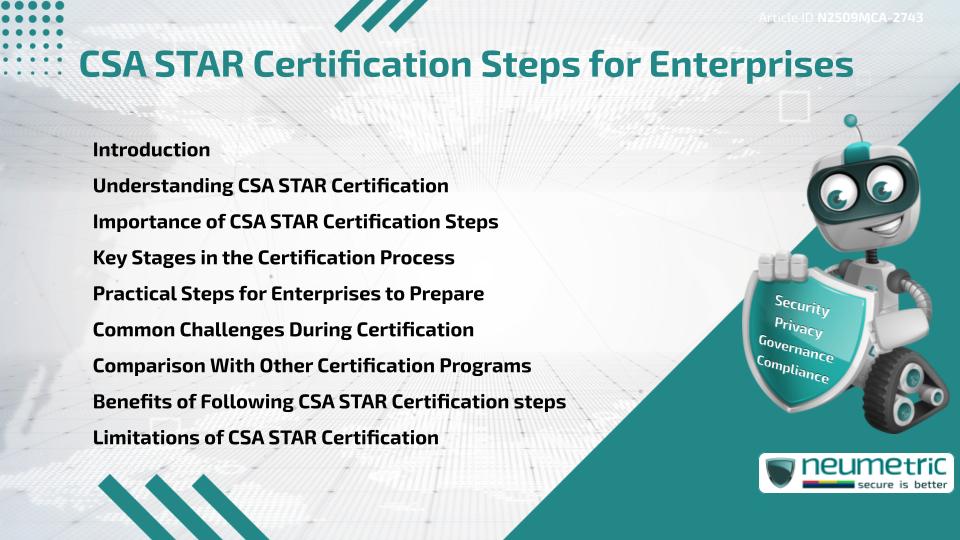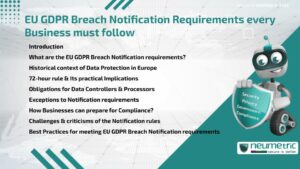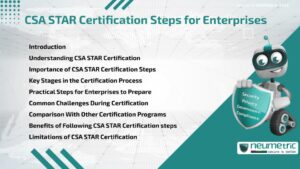Table of Contents
ToggleIntroduction
Enterprises adopting Cloud technologies must demonstrate Transparency, Accountability & robust Security Practices. The Cloud Security Alliance [CSA] created the Security, Trust, Assurance & Risk [STAR] program to provide a globally recognised Framework for Cloud Security assurance. At the core of this program are the CSA STAR Certification steps, which guide Organisations through Self-Assessment, independent Verification & Continuous Monitoring. By following these steps, enterprises can build Trust with Customers, meet Regulatory obligations & strengthen Cloud Governance.
Understanding CSA STAR Certification
CSA STAR Certification builds upon ISO/IEC 27001 & the CSA Cloud Controls Matrix [CCM], making it highly relevant for enterprises leveraging Cloud services. The program includes three levels of assurance:
- Level 1: Self-Assessment using the Consensus Assessments Initiative Questionnaire [CAIQ].
- Level 2: Third Party Certification by accredited Auditors.
- Level 3: Continuous Monitoring for real-time Compliance.
Importance of CSA STAR Certification Steps
Certification is more than a badge; it is proof of an enterprise’s commitment to Security & Compliance. The CSA STAR Certification steps help businesses adopt a structured path to strengthen internal practices. Much like Financial audits reassure investors, CSA STAR Certification assures Clients, Regulators & Partners that Security & Privacy obligations are being met.
Key Stages in the Certification Process
The Certification Process is structured & involves:
- Preparation & Gap Analysis: Identifying Gaps against CCM requirements.
- Documentation & Policy Alignment: Ensuring processes reflect Compliance needs.
- Self-Assessment: Completing the CAIQ for Transparency.
- Third Party Audit: Independent validation of Compliance.
- Continuous Monitoring: Ongoing assurance to maintain Certification status.
Practical Steps for Enterprises to Prepare
To achieve Certification successfully, enterprises should:
- Conduct Risk Assessments to identify Vulnerabilities.
- Update Policies & Procedures to align with CCM controls.
- Train staff on Compliance Requirements & Responsibilities.
- Engage with accredited Auditors early to streamline the process.
- Invest in Compliance tools to automate Monitoring & Reporting.
The British Standards Institution provides helpful guidance for enterprises preparing for certification.
Common Challenges During Certification
While CSA STAR is highly beneficial, enterprises often face hurdles such as:
- Complex IT Environments: Multi-Cloud systems complicate Compliance efforts.
- Resource Limitations: Certification can be costly & time-consuming.
- Vendor Dependencies: Ensuring Third Party providers align with STAR requirements.
Comparison With Other Certification Programs
Compared to SOC 2 or ISO/IEC 27017, CSA STAR is uniquely Cloud-specific. It emphasises Transparency by publishing Self-Assessments & offers multiple assurance levels. This makes CSA STAR more dynamic & adaptable for enterprises heavily reliant on Cloud services.
Benefits of Following CSA STAR Certification steps
By following the Certification steps, enterprises can:
- Build Customer Trust through validated Cloud Security practices.
- Align with global regulations such as GDPR & CCPA.
- Improve internal Governance & Risk Management.
- Gain a competitive advantage in the marketplace.
- Reduce the Likelihood of Security Breaches & Compliance penalties.
Limitations of CSA STAR Certification
Despite its value, CSA STAR Certification is not a one-size-fits-all solution. It can be resource-intensive, requiring significant time & expertise. Additionally, Certification provides assurance at a point in time & ongoing vigilance is necessary to stay compliant with evolving Threats.
Conclusion
The CSA STAR Certification steps provide enterprises with a structured & credible path to achieve Cloud Security excellence. While challenges exist, the long-term benefits of certification — including stronger Trust, Compliance & Operational Resilience — make it a vital component of Cloud Security strategy.
Takeaways
- CSA STAR builds on ISO/IEC 27001 & the Cloud Controls Matrix.
- Certification steps include self-Assessment, Third Party Audit & monitoring.
- Enterprises should prepare with Risk Assessments, updated Policies & Staff training.
- Benefits include Trust, Compliance & Market Competitiveness.
- Certification has limitations but remains highly valuable for Cloud assurance.
FAQ
What are CSA STAR Certification steps?
They are structured stages — Self-Assessment, Third Party Certification & Continuous Monitoring — for achieving CSA STAR Compliance.
Who should pursue CSA STAR certification?
Enterprises & Cloud service providers aiming to prove their Security & Compliance capabilities should pursue Certification.
How long does the Certification Process take?
Timelines vary, but it can take several months depending on enterprise size, scope & resources.
Is CSA STAR Certification mandatory?
No, it is voluntary but widely regarded as a best practice for Cloud-reliant enterprises.
How does CSA STAR differ from SOC 2?
SOC 2 covers general Security Controls, while CSA STAR is Cloud-specific & includes Transparency through published Self-Assessments.
What challenges do enterprises face during certification?
Challenges include complex IT environments, Resource constraints & Third Party Vendor dependencies.
Does Certification guarantee complete security?
No, Certification reduces Risks but cannot eliminate all Threats. Continuous Monitoring & Improvements are necessary.
Need help for Security, Privacy, Governance & VAPT?
Neumetric provides organisations the necessary help to achieve their Cybersecurity, Compliance, Governance, Privacy, Certifications & Pentesting needs.
Organisations & Businesses, specifically those which provide SaaS & AI Solutions in the Fintech, BFSI & other regulated sectors, usually need a Cybersecurity Partner for meeting & maintaining the ongoing Security & Privacy needs & requirements of their Enterprise Clients & Privacy conscious Customers.
SOC 2, ISO 27001, ISO 42001, NIST, HIPAA, HECVAT, EU GDPR are some of the Frameworks that are served by Fusion – a SaaS, multimodular, multitenant, centralised, automated, Cybersecurity & Compliance Management system.
Neumetric also provides Expert Services for technical security which covers VAPT for Web Applications, APIs, iOS & Android Mobile Apps, Security Testing for AWS & other Cloud Environments & Cloud Infrastructure & other similar scopes.
Reach out to us by Email or filling out the Contact Form…





